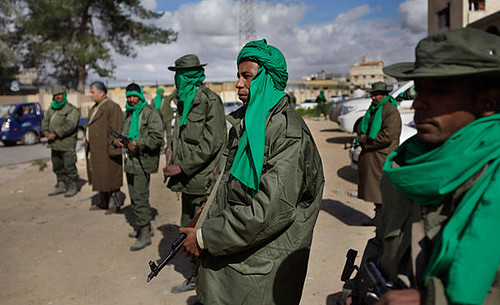
Libyan military forces stand guard at a checkpoint to guard against the counter-revolutionary forces that are backed by U.S. imperialism and its allies. The patriots have made significant headway in defeating the rebels., a photo by Pan-African News Wire File Photos on Flickr.
Libyan rebel advance slowed by mines, trenches
3:49pm EDT
* Rebels report Gaddafi counter-attack east of capital
* China backs African plan to end crisis
* Rebels claim advance on desert front
By Rania El Gamal
BENGHAZI, Libya, July 21 (Reuters) -Hundreds of thousands of mines and a fierce counter-attack by forces loyal to Muammar Gaddafi are slowing rebel efforts to seize two towns that are blocking their advance on Tripoli, rebels said on Thursday.
Libya's front line near the oil town of Brega, one of the last strongholds of Gaddafi's forces, has been deadlocked for weeks, without any conclusive fighting.
Colonel Ahmed Bani, a rebel military spokesman, said he expected a breakthrough in Brega in a few days, and in the western town of Zlitan within two days, after rebels advanced to the edge of the town.
"We are advancing slowly and clearing the mines ... but we know that at the end, we will enter it (Brega)," he told Reuters in an interview in the eastern rebel stronghold of Benghazi.
"The fall of Brega is the end of the regime."
Bani estimated that 400,000 mines had been planted around Brega and said the rebels, mostly volunteers with no military experience, were working to clear them with almost no help from experts. Gaddafi's forces have pushed back the rebels by filling trenches with petrol and setting them ablaze.
The rebel forces are now about 20 kms from the edge of Brega, but Gaddafi's forces still control the city and its oil installations, he said. The rebel forces are dug in east and south of Brega.
A rebel spokesman in Zlitan, on the coast road 160 km (100 miles) east of the capital, said pro-Gaddafi forces backed by tanks had surrounded rebels who had seized the nearby town of Souk al-Thulatha on Wednesday.
The soldiers had flattened homes with tank shells, he said in an Internet posting.
"The brigades are still terrorising the families, combing villages and neighbourhoods and spreading panic in the whole region," he said.
State TV showed what it said were fresh pictures from Zlitan and Brega in an apparent bid to show the towns were still firmly in Tripoli's hands. In Zlitan, dozens of Gaddafi supporters were shown chanting slogans of support.
In Gaddafi's home town, Sirte, which lies between Brega and Misrata, his supporters rallied on Thursday, waving green flags and vowing to defend his rule.
DIPLOMATIC PLANS
As the war drags on longer than many expected, separate diplomatic efforts to find a solution have intensified.
China said it would work with the African Union, which has proposed a plan that is seen as less hostile to the Libyan leader than a Western plan that insists on his stepping down.
President Hu Jintao told his visiting South African counterpart Jacob Zuma that the Africans had played an important role in pushing a political solution.
"China greatly appreciates this and is willing to continue remaining in close touch and to coordinate closely with South Africa and the African Union on the Libya issue," Hu said.
France said on Wednesday Gaddafi could stay in Libya if he gave up power, an apparent softening of the West's stance in a new effort to find a diplomatic end to the five-month-old war.
The United States said Gaddafi must quit, but whether he remained in Libya after that would be up to the Libyan people.
A U.N. diplomat said U.N. envoy Abdul Elah al-Khatib might go to Libya next week, sensing "a greater mood" in Tripoli to engage with his proposals. The diplomat gave no details, but said military and diplomatic pressure on Gaddafi was growing.
But Libya has dismissed the idea of Gaddafi's departure after 41 years in power, saying it was not up for discussion.
The rebels said no one was seriously expecting talks.
"No one talks about a political solution. Impossible. He closed all the doors," Bani said. "What do we tell the widower? What do we tell the mother who lost her children...We can't negotiate, people will devour us."
Some analysts have said Gaddafi is running short of fuel and food, which could stoke popular unrest ahead of the Muslim month of Ramadan which begins next week. During Ramadan, people prepare nightly feasts after fasting by day.
The state news agency JANA said officials met on Thursday to ensure food supplies "reach consumers as soon as possible before the start of Ramadan".
Gerald Howarth, British Minister for International Security Strategy, said there would be no pause in the war for Ramadan. "There will be no let up in the coalition activities to protect the people of Libya," he said. "It would be highly irresponsible to give Gaddafi any excuse to inflict the kind of brutality that he has displayed in the past."
(Additional reporting by Souhail Karam in Rabat, Lutfi Abu Aoun in Tripoli, Missy Ryan in Sirte, Sui-Lee Wee and Ben Blanchard in Beijing, Brian Love and Emmanuel Jarry in Paris, Patrick Worsnip in New York; writing by Richard Meares and Lin Noueihed, editing by Tim Pearce)
No comments:
Post a Comment